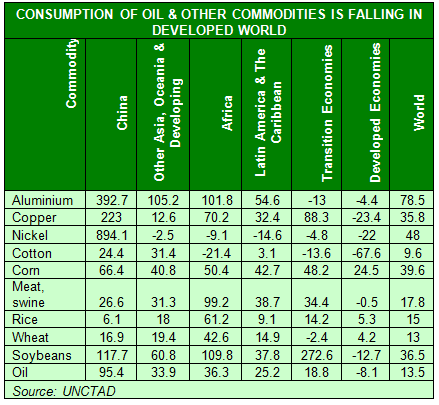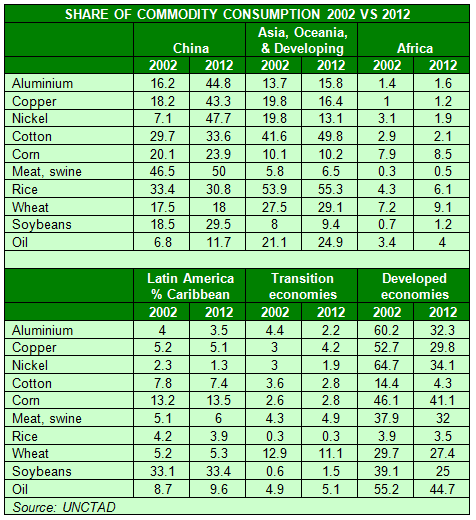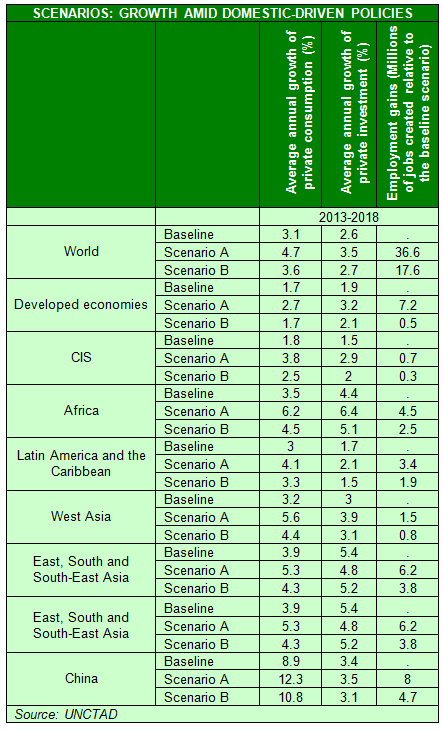Countries heavily dependent on commodity exports are economically vulnerable, especially as the commodity 'super-cycle' is expected to peter out, according to a new report.
"Developing and transition economies are likely to face sluggish import demand for their goods as a result of a protracted period of slow growth in developed countries," said The United Nations Conference on Trade and Development (UNCTAD) in a report published September 12. "Thus, for policymakers in the former set of countries, reverting to the pre-crisis policy stance with its emphasis on export-oriented growth is not an option."
Developed markets are already moving away from dependence on commodity exports. The latest report from the US Department of Energy shows the United States -- the world's largest consumer of oil - now consumes less crude than it did in 1973, even though its economy has grown threefold since then.
In other OECD countries, Japan, Germany and Italy are looking to transition from oil to natural gas and renewables, which could hurt exports from countries such as Saudi Arabia, Kuwait and the United Arab Emirates.


While surging exports have allowed many countries in the Gulf and Africa to boost growth, UNCTAD believes it is no longer a sustainable model for growth.
The report suggests that exports from developing and transition economies to developed economies before the global recession seemed to justify the adoption of an export-oriented growth model.
"But the expansion of the world economy, though favorable for many developing countries, was built on unsustainable global demand and financing patterns. Thus, reverting to pre-crisis growth strategies cannot be an option. Rather, in order to adjust to what now appears to be a structural shift in the world economy, many developing and transition economies are obliged to review their development strategies that have been overly dependent on exports for growth."
GULF DIVERSIFIES ECONOMY
The trend to move away entirely from exports is happening in some of the Gulf states, but perhaps not fast enough. The UAE has been most successful in developing an economy that - while underpinned by Abu Dhabi's oil production -- has emerged as a global player in financial services, tourism, retail and transportation sectors.
Qatar is also investing billions in developing its non-oil economy. Indeed, for the next few years, the country expects non-oil economy to grow at a faster pace than natural gas revenues.
In Saudi Arabia, the country's massive investment across virtually all sectors of the economy is seen as a massive transition to a more balanced economy that is not entirely dependent on oil prices.
Still, there is a long way to go. Energy accounts for more than 40% of exports from five Gulf states - Saudi Arabia, Qatar, UAE, Oman, Kuwait and Bahrain --, the only exception being the United Arab Emirates.
SOUTH-SOUTH TRADE
As the developed countries restructure their economies and reduce their imports, there is an opportunity for developing countries to forge closer trade ties.
The so-called South-South trade may be a crucial tool to generate growth in developing countries as some of the world's largest economies in the West work through their structural issues.
The two-way trade channel offers great potential, especially as South-South trade in total world trade has risen from just under 30% in 1995 to just above 40% by the end of last year.
"Moreover, the share of manufactures in a developing country's exports to other developing countries and the value added in such trade are usually much higher than they are in its exports to developed countries, which is testimony to the potential developmental role of South-South trade," UNCTAD said.
GROWTH SCENARIOS
The report also suggests a set of policies that could help accelerate growth in West Asia and the wider world.
In Scenario A, all countries, are assumed to pursue more expansionary macroeconomic policies needed to ensure a growth-enhancing environment. Meanwhile, Scenario B envisions constricted policies in developed economies, while emerging and transitional economies pursue growth-oriented policies.
Not surprisingly, the first scenario projects annual private consumption growth of around 5.6% to 6.5% for Middle East and West Asia over the next two decades -- one of the highest in the world. The region would also benefit from exceptionally strong private investment and employment for more than 40 million people during the period.
Scenario B projects lower growth than the first scenario, but still much higher than the baseline projections for the region.
If the model is replicated across the world, the global economy could see private consumption expand 4.7% to 6.2% each year over the next two decades, compared to the 2 to 3.1% baseline projection.
The clear message is that instead of underpinning growth model on exports, developing economies including those in the Middle East will need to strengthen their inner defenses, improve credit policies, welfare programs and tax and spending program to chart their next wave of growth.
A domestic demand-driven policy effort would lead to significantly better global economic outcomes than those resulting from the baseline scenario in which current policies are maintained, said UNCTAD.
"But even if developed countries were to persevere with their current policy stance, developing countries could still improve their economic performance by providing a coordinated economic stimulus. Hence, encouraging regional cooperation and South-South trade would need to be an important component of their development strategies."
SLOW GROWTH
UNCTAD also paints a grim picture of the global economy and even much of the emerging economies.
The Middle East, which UNCTAD refers to as West Asia including Turkey, has seen its gross domestic product slow down from 7.1% in 2011 to 3.2% in 2012 -- the organization expects the region to post a 3.5% growth this year.
"The Gulf Cooperation Council (GCC) countries maintained large public spending programs to support domestic demand and growth, despite scaling back their oil production during the last quarter of 2012 to support oil prices," UNCTAD said in its latest report published in early September.
And while the GCC economies are expected to get a lift due to high oil prices and continued investments, the rest of the oil-importing region could see growth crimp.
"The civil war in the Syrian Arab Republic not only greatly affected that country but continued to heighten perceptions of risk with regard to neighboring countries, which resulted in subdued investment, tourism and trade in Jordan and Lebanon," the report noted.
© alifarabia.com 2013




















